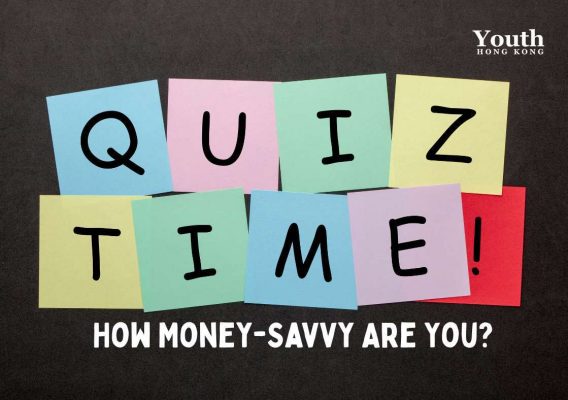Financial literacy isn’t a one-time lesson—it’s a lifelong journey for everyone, regardless of age or career stage. Take the quiz to test your financial knowledge.
1. Buying a coffee every day for HK$30 doesn’t really impact your finances in the long run.
Hint: Small leaks can sink big ships!
2. Which is more important to you?
3. All credit cards charge interest only if you miss a payment.
4. Which of the following is considered a 「need」 rather than a 「want」?
5. How does inflation affect your savings?
6. What does 「compound interest」 mean?
7. Suppose you invest in a stock, and its price drops by 20%. What would you do?
8. Short Answer
You earn HK$18,000 a month. How much should you aim to save if you follow the 50/30/20 budgeting rule?
Hint: 20% goes into savings!
9. Short Answer
What’s one free way to start investing in yourself financially before spending any money?
10. Which of the following apps or tools is least likely to help you manage your money?
11. Your credit score in Hong Kong can affect your ability to rent a flat or get a loan.
12. What is diversification in investing?
13. What is one of the biggest risks of investing in cryptocurrency?
14. Short Answer
Name one risk of using Buy Now, Pay Later (BNPL) services.
________________Can’t wait to know the answers?___________________
1. False
Spending HK$30 a day on coffee adds up to over HK$10,000 a year. Small daily expenses can have a big impact on your long-term finances.
2. Six months of expenses saved in the bank
Financial security ensures stability during emergencies; a car is a depreciating asset. Prioritize essentials over luxury.
3. False
Most credit cards charge interest if you don’t pay the full balance, even if you make the minimum payment. Interest can start accruing right after the due date.
4. B. Monthly rent
A need is something essential to your survival or daily living — like housing, food, and basic utilities. The others are discretionary spending (wants).
5. B. Reduces the real value of savings
Inflation erodes purchasing power over time, meaning your saved money buys less than before, even if the nominal amount remains unchanged.
6. B. Interest earned on both the money you saved and the interest it earns
Compound interest helps your savings grow faster over time, because you earn 「interest on your interest」. It’s a powerful tool for building wealth.
7. D. Consult a professional before deciding
Ensures informed, personalised decisions and avoids emotional reactions, aligning with your financial goals, risk tolerance, and market conditions.
8. HK$3,600
Using the 50/30/20 rule, 20% of HK$18,000 = HK$3,600 should go towards savings. This rule helps you balance needs, wants, and future goals.
9. Example answers:
Reading personal finance articles or books
Watching financial literacy videos
Creating a simple budget
Tracking your spending habits
Investing in your financial knowledge is free and can change your money mindset and habits.
10. C. Social media influencer’s shopping tips
While entertaining, shopping tips from influencers often promote spending rather than saving. Budgeting and tracking tools help you take control of your finances.
11. True
Your credit report can affect your ability to get loans, credit cards, or even rent a flat. A good credit score shows you’re financially responsible.
12. B. Spreading investments across different assets to reduce risk
Diversification helps protect your portfolio — if one investment performs poorly, others may balance it out. It’s a key risk management strategy in investing.
13. B. Lack of regulation, making it prone to scams or hacking
Cryptocurrencies are largely unregulated, increasing risks like fraud, market manipulation, and security breaches compared to traditional investments.
14. Example answers:
Risk of overspending or impulse buying
Accumulating debt without realising it
Missed payments leading to late fees or credit score impact
Buy Now, Pay Later (BNPL) services are convenient but can encourage poor spending habits if not managed carefully.


